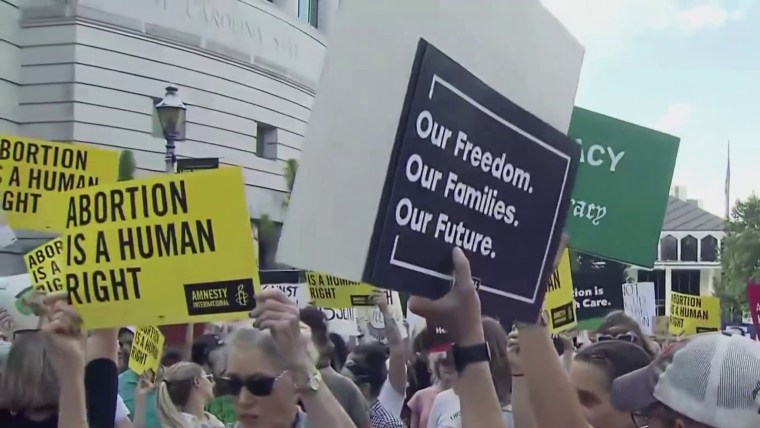WASHINGTON — Attorney General Merrick Garland indicated Friday that the Justice Department would combat any Republican efforts to restrict access to abortion pills after the Supreme Court reversed Roe v. Wade, setting the stage for potential legal battles with some GOP-led states.
“The Justice Department will work tirelessly to protect and advance reproductive freedom,” Garland said in a lengthy statement after the Supreme Court ruling.
He said the department is “ready to work with other arms of the federal government that seek to use their lawful authorities to protect and preserve access to reproductive care. In particular, the FDA has approved the use of the medication Mifepristone. States may not ban Mifepristone based on disagreement with the FDA’s expert judgment about its safety and efficacy.”
The two-drug regimen of medication abortion, as it’s clinically known, was first approved by the Food and Drug Administration in 2000. People have been able to get mifepristone by mail since last year, when, due to the pandemic, the FDA suspended a requirement that it be administered in person. The agency made that option permanent in December.
In a separate statement Friday, the White House said it’s working to make the drug, which can be used up to 10 weeks of pregnancy, widely available.
“In the face of threats from state officials saying they will try to ban or severely restrict access to medication for reproductive health care, the president directed the Secretary of Health and Human Services to identify all ways to ensure that mifepristone is as widely accessible as possible in light of the FDA’s determination that the drug is safe and effective—including when prescribed through telehealth and sent by mail,” the White House said.
Thirteen states have trigger laws going into effect that will ban all or nearly all abortions, including medication abortions, in the wake of Roe’s reversal.
Legal experts predicted there would be numerous court challenges following Friday’s court ruling.
Khiara M. Bridges, a law professor at the University of California, Berkeley, said “there’s an open legal question about whether states could limit the use of mifepristone in light of the FDA’s judgment that the medicine is safe and effective. It’s not at all clear.”
While the FDA can can declare the drug is safe, Bridges said, “states can regulate the practice of medicine within their borders.”
The drug’s manufacturer, GenBioPro, filed suit against Mississippi in October 2020 challenging a state law that hampers access to the drug, contending that the statute conflicts with federal law. The case is still pending.
Bridges said the Justice Department could sue any states restricting access to the drug, but noted such challenges could take years to make their way through courts. “I think we’re going to see a lot of legal questions,” she said.
Wendy Parmet, director of the Center for Health Policy and Law at Northeastern University, said it’s unclear “whether the FDA can preempt a state’s prohibition” on mifepristone.
“We don’t have a Supreme Court decision on [this] point, and even if we did, we have a Supreme Court willing to overturn decisions,” Parmet said. “This court is emboldened and willing to change the law. That means a lot of things we think we know we don’t know, because everything is up for grabs at the moment.”
Amanda Allen, a senior counsel at the Lawyering Project, a group that represents abortion providers, called Garland’s comments on mifepristone “very vague.”
“It’s unclear from the language in the statement what he actually plans to do,” Allen said.
In his statement, Garland also indicated the Justice Department would fight any attempts to penalize women who travel to another state to get an abortion.
“We recognize that traveling to obtain reproductive care may not be feasible in many circumstances. But under bedrock constitutional principles, women who reside in states that have banned access to comprehensive reproductive care must remain free to seek that care in states where it is legal,” Garland said.
A bill introduced in Missouri earlier this year that would make it illegal to “aid or abet” an abortion for a Missouri resident outside the state was blocked by legislators in March.
In a concurring opinion to overturn Roe on Friday, Justice Brett Kavanaugh suggested such a measure could be unconstitutional.
“[M]ay a State bar a resident of that State from traveling to another State to obtain an abortion? In my view, the answer is no based on the constitutional right to interstate travel,” Kavanaugh wrote, in addressing what he characterized as “some of the other abortion-related legal questions raised by today’s decision.”
In its statement Friday, the White House said it would fight any effort to block a woman from crossing state lines to get an abortion.
“A person has the right to travel between states for whatever reason they want — it is no one else’s business — especially the government’s,” the White House said. “If any state or local official tries to interfere with women exercising this basic right, the Biden Administration will fight that deeply un-American attack.”
Allen, of the the Lawyering Project, said there are no state laws prohibiting women from getting an abortion in a different state, and that Garland may be “trying to get out in front of some of the things you’re going to see next.”
Northeastern University’s Parmet said that one thing is clear: the country is heading into uncharted legal waters.
“What’s coming is more court battles, more litigation, more controversy, more heated battles,” she said. “That’s the one thing we know that’s coming.”

